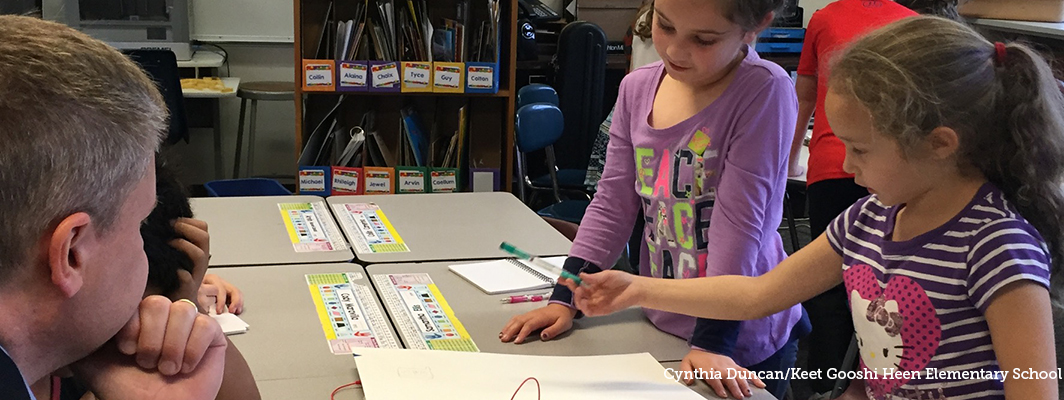
This post is part of a series in which we frame maker learning in terms of three core values – Agency, Authenticity, and Audience – as the key components to creating the highest quality making experiences for learning.
We recently highlighted some of the very important reasons to include maker learning in a school’s academic program, as well as a few of the efforts that Digital Promise is undertaking to help. This post is part of a continuing series that will highlight the values that lead to the highest quality and most effective implementation of maker learning: Agency, Authenticity, and Audience. When we frame making in terms of these three values, we are reminded that making is most importantly a way to learn, and not only a set of skills to learn about.
Valuing student agency is not a new idea to education. Long-standing and effective learning philosophies and methodologies have been designed around this principle including Reggio Emilia schools and the Montessori method. As with these progressive educational standard-bearers, agency is more than just making simple choices such as, “You get to choose which worksheet to do first,” or “Which robotics kit would you like to assemble?” Instead, students should be invited to design their own learning pathways and projects to pursue based on genuine interest and inquiry.
This approach is supported by research as well. Deci and Ryan’s Self-Determination Theory highlights the importance of autonomy, a close relative of agency, in fostering intrinsic motivation. Increasing student engagement and motivation is often cited as a key reason for engaging in maker learning by school leaders and teachers. One important way to engage and identify autonomy is to enable and structure self-assessments and reflections that allow a student to confidently identify when a project is finished, or when it requires more work or another iteration, without relying on the approval of the teacher.
Agency is about more than just autonomy and choice, but empowerment as well. The “Purpose for Learning” theory shows that students are better motivated and learn more when they can explicitly see how their work can help them help others. A key finding of the research of Agency by Design, a research group from Harvard’s Graduate School of Education, is that maker learning helps to empower students to see themselves as builders and shapers of their world. By taking on a maker-centered approach to learning we help our students recognize that our society has been designed by people, and that their generation is not only empowered to, but obligated to use their skills and knowledge to change the world for the better.
The Challenge Based Learning Global Goals challenge and a similar project taking place in Digital Promise Global’s Learning Studios are some of the ways we are directly engaging educators and students in empowering maker learning with a focus on creating a better tomorrow. Working from these broad challenges we have seen second graders in Sitka, Alaska choose to work on creating accessibility devices for disabled peers; fourth graders in Niagara, Canada are creating an interactive art exhibit to highlight damage to their local wetlands; and high school students in Barcelona, Spain are designing a model for a completely sustainable future city. And this approach to learning doesn’t have to be a one-off project: Loudoun County Public Schools have embedded these ideas into their district-wide technology plan as part of their “One to the World” initiative.
It is through engaging this type of agency that maker learning facilitates more than just learning STEM skills or increasing student engagement. When we couple this learning with a focus on empowerment, empathy, and change, we are not only helping to shape the next generation of designers and engineers but also the philosophers, activists, artists, and leaders. And, we are not just training them to build things, but to build the ideas, systems, and ethics that will keep society moving forward.
Show your support for this work, and sign up to receive resources and support for doing this with your students by joining the Maker Promise. In the coming months we have many resources, project ideas, and inspirations we plan to share with Maker Promise schools to help create agency rich maker learning experiences for all students.
Read: A Primer on Maker Learning and How You Can Get Involved